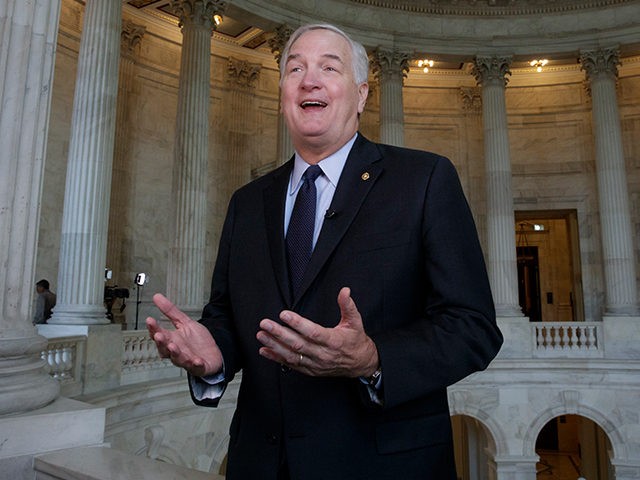NEW YORK — During a period he served as Alabama Attorney General, Luther Strange received more campaign contributions than any other U.S .attorney general from members of a controversial lobby group peddling the dangerous prescription pain medication business amid an ongoing opioid crisis in Alabama.
Strange’s benefactors may raise some eyebrows in the White House, after President Trump last month declared the opioid epidemic a national emergency. The designation opens the door for federal and state agencies to provide more resources to fight the scourge.
Backed financially by big pharmaceutical companies, Strange led an effort that culminated in a letter to the U.S. Food and Drug Administration (FDA) signed by other attorneys general urging the agency not to approve generic versions of highly addictive opioids unless the companies use so-called tamper-resistant or abuse-resistant technology that at the time was mostly available to the major drug companies and not generic competitors.
An investigation by the Center for Public Integrity and The Associated Press previously found that the effort outlined in Strange’s letter essentially left the opioid market for several years to big drug companies like Purdue and Pfizer.
This while the effectiveness of “tamper-resistant” and “abuse-resistant” opioids have been called into question by experts and the FDA itself, which points out that those kinds of pills may limit people from snorting or injecting drugs but the medication does little to stop patients from becoming addicted by taking drugs the most common way, swallowing them whole.
The issue of opioid prescription is critical in Alabama, a state that has the highest rate of prescription opioid use in the U.S., according to the Centers for Disease Control and Prevention (CDC).
Also, in July, a report found that Alabama members of Blue Cross Blue Shield evidenced alarming trends of opioid prescription rates.
Blue Cross Blue Shield is the 12th largest donor to Strange’s Senatorial coffers, according to Open Secrets, contributing $15,000.
The local Al.com reported on the massive Blue Cross Blue Shield opioid prescription rates:
Alabama members of Blue Cross Blue Shield receive more opioids for longer periods of time and report higher rates of substance use disorder than patients in almost every other state, according to a report released Thursday.
An analysis of claims filed by Blue Cross members ranked Alabama in the top three for opioid prescriptions filled, long-term painkiller use and diagnoses of opioid use disorder. More than 26 percent of Blue Cross Blue Shield members in the Yellowhammer State filled prescriptions for opioids in 2015, compared to the national average of 21.4 percent.
Pain Medication Lobby Group members donated to Strange
Strange was appointed to the Senate in February, after Jeff Sessions vacated his seat to become U.S. Attorney General. Prior to his appointment, Strange served for six years as Alabama’s Attorney General.
The AP and Center for Public Integrity report found that members of a major drug lobby group called the Pain Care Forum donated more money to Strange than to any other attorney general during a nine year period.
The report revealed:
Since 2006, Pain Care Forum participants have given more than $600,000 in campaign contributions to attorneys general candidates, and another $1.6 million to the Republican and Democratic attorneys general associations. Purdue, with $100,000 in 2015 alone, tied with four other entities for top contributor to the Democratic Attorneys General Association; it was among the top 10 donors to the Republican group, giving more than $200,000.
… Strange has received $50,000 in campaign contributions from Pain Care Forum members, more than any other attorney general from 2006 through 2015, with more than $20,000 of that coming from Pfizer.
Strange’s current Senate race is also backed by Pfizer.
The Morning Call, the third largest newspaper in Pennsylvania, characterized the Pain Care Forum as an “opaque group of more than 100 drug manufacturers and advocacy groups that coordinates efforts to influence legislation concerning prescription pain medications on both federal and state levels.”
The Forum has repeatedly lobbied against legislation that would limit the prescription of opioids, reportedly spending at least $14 million alone on state-level lobbying.
In March 2013, Strange spearheaded an effort that sent a letter signed by himself and 47 other attorneys general to then-FDA Commissioner Margaret A. Hamburg encouraging the development of “tamper- and abuse-resistant opioid products.”
Strange defended his effort. “As Attorney General, I will not apologize for my efforts to protect Alabamians from a drug abuse epidemic that is claiming more lives than automobile accidents in my state,” he stated.
An FDA blog post defines so-called tamper-resistant drugs as “tablets or capsules that are designed to deter abusers from crushing them into a powder for swallowing, snorting or injecting to create a faster, more intense high.”
The AP and Center for Public Integrity report notes that so-called tamper-resistant drugs are actually more profitable to big drug companies:
Now, pharmaceutical companies are directing their lobbying efforts to their new legislative frontier in the states — medicines known as abuse-deterrent formulations. These drugs ultimately are more lucrative, since they’re protected by patent and do not yet have generic competitors. They cost insurers more than generic opioids without the tamper-resistant technology.
Experts have questioned the effectiveness of abuse-resistant drugs. Indeed, the FDA itself warns that abuse-resistant prescription drugs “have not yet proven successful at deterring the most common form of abuse—swallowing a number of intact capsules or tablets to achieve a feeling of euphoria.”
“Moreover, the fact that a product has abuse-deterrent properties does not mean that there is no risk of abuse,” relates the FDA in an April 2015 paper titled, “Abuse-Deterrent Opioids — Evaluation and Labeling.”
Aaron Klein is Breitbart’s Jerusalem bureau chief and senior investigative reporter. He is a New York Times bestselling author and hosts the popular weekend talk radio program, “Aaron Klein Investigative Radio.” Follow him on Twitter @AaronKleinShow. Follow him on Facebook.
Written with additional research by Joshua Klein.

COMMENTS
Please let us know if you're having issues with commenting.